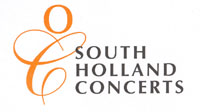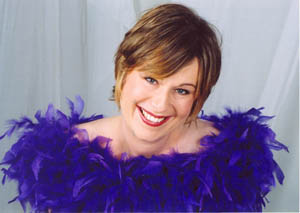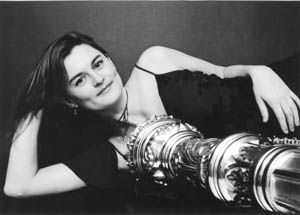Programme
La Lettre du Jardinier - Marcel Tournier (1879-1951)
2 Sonnets - Andre Caplet (1878-1925)
Sonata in D Major - John Parry (c.1710-1782)
Folk Songs - Benjamin Britten (1913-1976)
Etude de Concert op.193 - Felix Godefroid (1818-1857)
INTERVAL
18th Century Folk Songs - Jean-Baptiste Krumpholtz (1742-1790)
A Birthday Hansel - Benjamin Britten (1913-1976)
Irish Folk Songs - Anon.
The Nightingale (Unaccompanied) - Camille Saint-Saëns (1835-1921)
Rusalka's Song to the Moon - Anton Dvorák (1841-1904)
Oh my Beloved Father (from Gianni Schicchi) - Giacomo Puccini (1858-1924)
La Lettre du Jardinier - Marcel Tournier (1879-1951)
The French composer and harpist Marcel Tournier was born
in Paris and actually began his studies as a pianist. His father, a
maker of string instruments, desired that each of his five sons be taught
to play a different stringed instrument. Marcel, showing early musical
talent, entered the Paris Conservatoire, where he studied the harp and
composition. After only four years of study there with the famous Belgian-born
harpist, Alfonse Hasselmans, he won the prestigious Prix de Rome at
the Conservatoire. Also, early compositions, under the guidance of Widor,
showed Tournier to have a strong feeling for impressionism and romantic
melody. Early stage works such as 'Laura and Petrarch' helped to establish
his reputation.
But it was as a harpist that Tournier's name is most remembered.
He succeeded Hasselmans at the Conservatoire at the age of thirty-three,
and remained there until his retirement in 1948. Though he is not well
known to the general concert-going public, he has produced a fine body
of beautifully-crafted and tuneful works for the harp alone and other
short pieces in combination with various instruments and voice.
2 Sonnets - Andre Caplet (1878-1925)
French conductor and composer, André Caplet, was
born in Le Havre. His early talent on violin was such that he was invited
to play in his local theatre orchestra when he was only twelve years
old! He too studied at the Paris Conservatoire where his early promise
as a future conductor of national reputation was properly identified
and nurtured. In the years that followed, he accepted many conducting
appointments, while composing a small but uniquely fine body of expressive
small-scale compositions. His songs, and works for flute and for the
harp show considerable sensitivity and refinement. He was a close friend
of Debussy, who trusted Caplet implicitly as a definitive conductor
of many of his works.
Caplet suffered badly as a result of a gas attack during
the First World War, forcing him to resign all his conducting posts,
and eventually he died at the early age of 47.
Sonata in D Major - John Parry (c.1710-1782)
Allegro; Andante; Gavotte
Welshman John Parry has been recognised as the most distinguished
harpist of his generation in Great Britain. He was blind, but was taught
to play the Welsh triple harp by a relative. (see - Brief notes on the
Harp in this programme booklet)
His reputation grew quickly - his talents impressing the
composer Handel. His playing is also said to have inspired the poet
Thomas Gray in the writing of his ode The Bard, and there is some evidence
that Parry became harpist to the Prince of Wales - later King George
III.
This sonata, part of a set of four sonatas published for
the triple harp in 1752, is in similar style to the music of Handel,
Corelli or Vivaldi, but contains a hint of Parry's Welsh roots. The
second movement is reminiscent of the Welsh tune David of the White
Rock.
Folk Songs - Benjamin Britten (1913-1976)
Eugeilio'r Gwenith Gwyn
David of the White Rock
The Lark in the Clear Air
Salley Gardens
For most music lovers, Benjamin Britten needs little introduction.
Thirty years after his death, his music (while constantly subject to
re-evaluation) is still widely performed and enjoyed. The Suffolk coast
of his birth remained a constant influence in his music, and it was
a love he shared with his life-long friend and companion, the tenor
Peter Pears. From the early influence of his teacher Frank Bridge at
the Royal College of Music, Britten quickly developed a uniquely individual
voice in composition - instantly recognisable even if at times eclectic.
Britten's large folksong collection is divided into three
groups. Between the earliest songs (published 1943-47) and the second
published group, there was gap of twelve years. The last songs (mostly
with guitar accompaniment) appeared in 1961 with a final set of eight
songs with harp dating from 1976 - the year the composer died.
Britten nearly always wrote with specific artists in mind.
Peter Pears and the soprano Sophie Wyss were the intended artists for
most of these songs, specifically to be accompanied by himself (piano),
Julian Bream (guitar), or Ossian Ellis (harp) as required. It is likely
that it was Pears who first drew Britten's attention to folksong arrangements
as encores for their concert performances together. These delightful
pieces display the same expressive care in the setting of texts as characterises
all Britten's popular operas and stage works.
Etude de Concert op.193 - Felix Godefroid (1818-1857)
During the nineteenth century, harp construction was becoming
refined and the instrument was becoming more versatile. Harp schools
were flourishing in all the principal cities of Europe. Probably the
most famous school was founded at the Paris Conservatoire in 1825 by
the harpist, F J Naderman. Among Naderman's pupils were Felix Godefroid
and his brother Jules. Felix, who was referred to as the 'Paganini of
the harp', was the more celebrated. He left the Conservatoire frustrated
at the continued use there of single-action harps when new double-action
instruments were becoming widely popular. (see Brief Notes on the Harp.)
Godefroid wrote extensively for his instrument, even incorporating
a harp fantasy into an opera that he composed in 1858 called The Golden
Harp, in which he performed the important off-stage harp solo himself.
He also composed technical studies and concert pieces, and in the Etude
we are to hear tonight, left hand harmonics are supported by delightful
right hand decoration.
INTERVAL
18th Century Folk Songs - Jean-Baptiste Krumpholtz
(1742-1790)
1) Je voulois Sylvie
2) Puisque mon éspoir
3) Au fond d'une sombre vallée
Jean-Baptiste Krumpholtz was a significant figure in the
harp world of the eighteenth century. In his early thirties he became
a composition pupil of Joseph Haydn, and harpist in the renowned orchestra
of the Austrian court of Count Esterházy. With Haydn's support,
Krumpholtz toured Europe extensively, performing his concertos and sonatas
and demonstrating the latest technical improvements made to the instrument.
One of these was the important introduction of the new pedal harp system
similar to that in use today. (see Brief Notes on the Harp.)
A Birthday Hansel - Benjamin Britten (1913-1976)
1) Birthday Song
2) My Early Walk
3) Wee Willie
4) My Hoggie
5) Afton Water
6) TheWinter
7) Leezie Lindsay
This is another late song cycle by Britten again composed
for his close friends, Peter Pears and Ossian Ellis. It dates from 1975
and is a setting of seven poems by the Scots poet Robert Burns (1759-1796).
It was commissioned by the Queen for the 75th birthday of the Queen
Mother, and within this remarkable set we can hear the sounds and impressions
of Scotland resonating not only through the text, but through the music
as well.
Irish Folk Songs - Anon.
These are Irish traditional songs which have been handed
down in the oral tradition, and notated only relatively recently.
The Nightingale (Unaccompanied) - Camille Saint-Saëns (1835-1921)
Although Saint-Saëns is remembered mainly, perhaps,
for his magnificent symphonic works and concertos, he was deeply committed
throughout his life to writing for the voice. Besides a large body of
sacred choral music, there are dozens of finely crafted songs. Among
these are settings of Victor Hugo, Molière, Tennyson, and even
a number of texts written by Saint Saëns himself.
A very aesthetic composer, Saint-Saëns will probably
have had a certain influence upon composers such as Ravel. But his influence
was naturally most significant on his student Gabriel Fauré.
Rusalka's Song to the Moon - Anton Dvorák (1841-1904)
Rusalka's Song to the Moon is probably the most famous
aria in Dvorák's opera Rusalka, which he composed in 1901. (A
rusalka is a water spirit which, according to Slav mythology, inhabited
lakes and rivers.) The fairy tale on which the plot is based contains
certain elements which also appear in Hans Andersen's Little Mermaid.
In this beautifully lyrical Song to the Moon Rusalka,
the water spirit, sings to the moon of her love for a human man and
her desire to be part of his world. Later in the action, having been
forced into a pact of silence by a witch, Rusalka is impelled to kill
the man she loves, and the opera then ends in tragedy.
Oh my Beloved Father (from Gianni Schicchi) - Giacomo Puccini (1858-1924)
Puccini is a composer who has a following of passionate
devotees. His operas, like Tosca, La Bohème, and Madam Butterfly,
still fill opera houses worldwide.
Gianni Schicchi is a one act opera written in 1918 based upon a passage
from Dante's Inferno. The plot, however, is a comic one concerning the
affair of two lovers, Rinuccio and Lauretta (Schicchi's daughter). Rinuccio
has fallen on hard times since his family benefactor, Donati, has died,
leaving all his riches to a local monastery.
Schicchi wishes nothing more to do with Rinuccio until
Lauretta pleads with her father in the aria "Oh my beloved Father"
for his understanding of the depth of their love. As the story develops,
Schicchi plots to obstruct Donati's will and thus ensure a secure future
for his daughter's fiancé after all.
Notes and articles by Peter Case for South Holland
Concerts
(South Holland Concerts acknowledges the assistance
of the artists in providing some points of information on the works
performed.)


